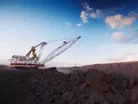3 Hurdles BHP is Confident it will Overcome

Like many in the mining sector, BHP Billiton has been hit hard by decreased demand and price. The company’s stock was among the ASX’s heaviest fallers this week, and although most analysts believe BHP will pull out of the decline in the long term, some do not agree.
There are three specific issues that BHP will have to overcome, but with the company’s commitment to productivity, efficiency and continued safety, they are confident the hurdles will be overcome.
Iron ore
Although BHP is pretty well diversified, iron ore is the company’s primary generator of revenue; they are even looking to ramp up annual production rates in the future. However, the price of iron ore has dropped recently, and could fall much lower (and sooner rather than later). Even though BHP maintains a low breakeven price, a fall that large could end up affecting overall margins.
BHP opened the Jimblebar iron ore mine 23 April of this year, in the Pilbara region of Western Australia. The US$3.2 billion mine has already delivered the first production in the quarter which ended in September of 2013. The mine is expected to deliver 35 mtpa in phase one capacity by the end of the 2015 financial year. This, plus the installation of four mobile crushers, will increase the total capacity of the Western Australia Iron Ore supply chain to over 220 mtpa.
“Mobile crib rooms and fuelling stations have been positioned closer to the mine pits so our trucks and equipment spend more time moving earth and less time travelling or parked out of action,” said Jimmy Wilson, BHP’s iron ore president.
“Our pursuit of productivity gains and operational excellence is delivering significant value at Western Australia Iron Ore. The business is now well positioned to deliver high margin volume growth at a substantially lower cost.
“We are also pleased to announce we are extending our Jimblebar autonomous truck trial to the neighbouring Wheelarra operations using six Caterpillar 793-F trucks in the second trial.”
Coal
The price of coal has been in a rapid decline since the beginning of 2011. Even BHP’s boss does not see relief in the short term. This had led the company to look at sacrificing short-term earnings in the hopes that the long-term outlook remains strong. BHP’s approach could deter investors.
Over the last few decades, the industry as a whole has been committed to making considerable investments in technology, in turn making mines safer and more efficient. This efficiency will be key in the coming months and years – production will remain high, but at a lower cost to the company.
In a speech from April of 2014, BHP president Dean Dalla Valle conveyed that the company has the equipment, technology, infrastructure and expertise to operate safer and more efficient than ever before. And although the tough time has called for hard decisions, the company is working to transform the culture of the industry to keep up with the changing prices and demands. BHP Billiton’s goal is to continue to remove barriers by working smarter (but not sacrificing safety) to deliver long-term productivity gains.
China’s slow-down
Much like the other two factors, the slowing of growth in China has affected BHP, but also many other companies in the sector, including Fortescue Metals Group and Rio Tinto. BHP has no control over this situation, and can only hope to cover any losses with the revenue from their increased efficiency move.
- Onslow Iron's first transhipper launchedSupply Chain & Operations
- Green mining market set to grow exponentially in 2023Sustainability
- Samarco, a Vale-BHP JV, plans to raise $2bn in restructuringSupply Chain & Operations
- Unmanned train to allow Vale to reopen iron ore plantSupply Chain & Operations



